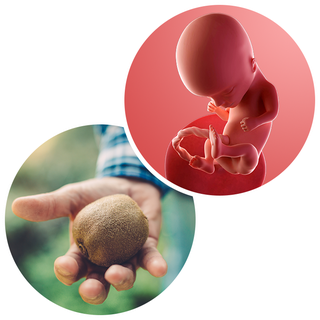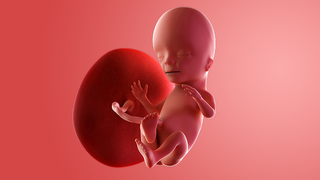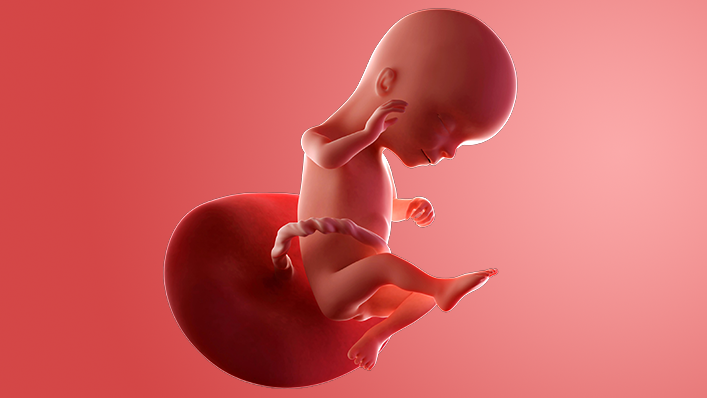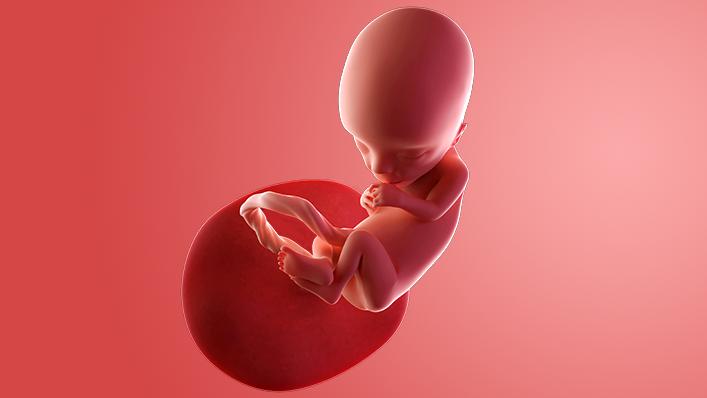- Week 13
- Week 14
- Week 15
- Week 16
- Week 17
- Week 18
- Week 19
- Week 20
- Week 21
- Week 22
- Week 23
- Week 24
- Week 25
- Week 26
- Week 27
Week 14
Hopefully you are starting to feel less tired and sick now. As your energy levels return, your appetite might too.
Remember, your baby does not need any extra calories at this point. Too much weight gain in pregnancy is not good for you or your baby.
If you get hungry between meals try sticking to healthy snacks.
What's happening in my body?
The placenta is full of blood, and pumps out nutrients, oxygen and hormones, while removing waste products such as carbon dioxide. The placenta is firmly attached to your womb and links up with your baby through the umbilical cord.
Your blood and the baby's blood come into close contact in the placenta, but they do not mix. That's because you might be different blood groups, and mixing them up could be dangerous.
Colostrum
You may notice some yellow stains in your bra – this is probably colostrum, which is the first milk you will produce.
Ask the doctor or midwife to have a look if you're worried about any changes.
Remember to talk
Relationships can come under strain when you're pregnant, due to all kinds of worries. Talk about your feelings and speak to your doctor or midwife if you feel like you're not coping.
How should I sleep in pregnancy?
In the early days of pregnancy it's fine to sleep on your stomach. Your bump will not start showing until the 2nd trimester and sleeping on your stomach is unlikely to be uncomfortable. However, in your 3rd trimester (after 28 weeks of pregnancy), it's safest to go to sleep on your side as this helps reduce the risk of stillbirth. This advice applies when you are:
- going to sleep at night
- getting back to sleep, after waking up at night
- having a daytime nap
Don't worry if you wake up on your back, just turn onto your side and go back to sleep. Read about sleep positions in pregnancy on the Tommy's website.
2nd trimester pregnancy symptoms (at 14 weeks)
You may still be experiencing pregnancy symptoms including:
- swollen and bleeding gums (read about gum health in week 13)
- pains on the side of your belly, caused by your expanding womb (known as 'round ligament pains')
- headaches (read about headaches in pregnancy on NHS.uk)
- nosebleeds
- feeling bloated (read how to cope with bloating on week 10's page)
- constipation (read how to deal with constipation on week 16's page)
- indigestion and heartburn (read about how to treat indigestion and heartburn on week 25's page)
- sore breasts
- leg cramps
- feeling hot
- dizziness
- swollen hands and feet
- urine infections
- vaginal infections (read about vaginal infections in week 15
- darkened skin on your face or brown patches – this is known as chloasma or the 'mask of pregnancy'
- greasier, spotty skin
- thicker and shinier hair
You may also experience symptoms from earlier weeks, such as:
- morning sickness (see week 6 for morning sickness advice)
- weird pregnancy cravings
- a heightened sense of smell
- mood swings (read about dealing with mood swings on week 8's page)
- a white milky pregnancy discharge from your vagina and light spotting (seek medical advice for any bleeding)
What does my baby look like?
Your baby, or foetus, is around 8.5cm long from head to bottom, which is about the size of a kiwi fruit. The head is getting rounder and more in proportion with the rest of the body.
Your baby is kicking around, but you probably won't feel it yet. However, your midwife might be able to hear the heartbeat, using a handheld monitor placed on your tummy.
Inside you, your baby is doing something quite miraculous – having a wee!
Small amounts of the amniotic fluid are swallowed by the baby and pass into the stomach. The kidneys then kick in and the fluid is passed back out again as urine.

Action stations
More in week-by-week

Week 15
You might feel fine now, but as you get bigger, you will be more unstable on your feet, and falling over could be stressful and even dangerous.
More in week-by-week guide to pregnancy


